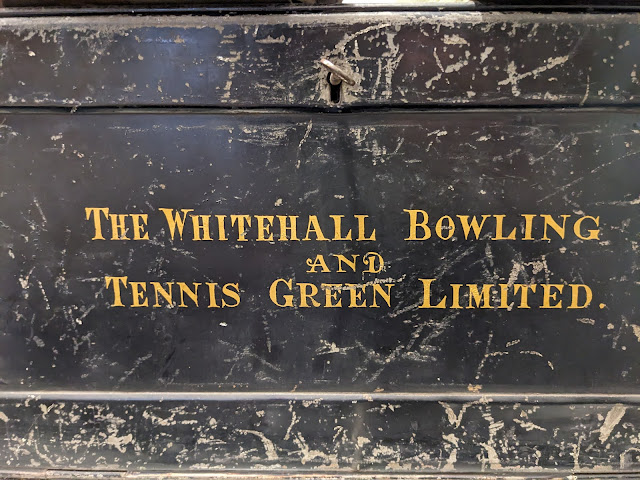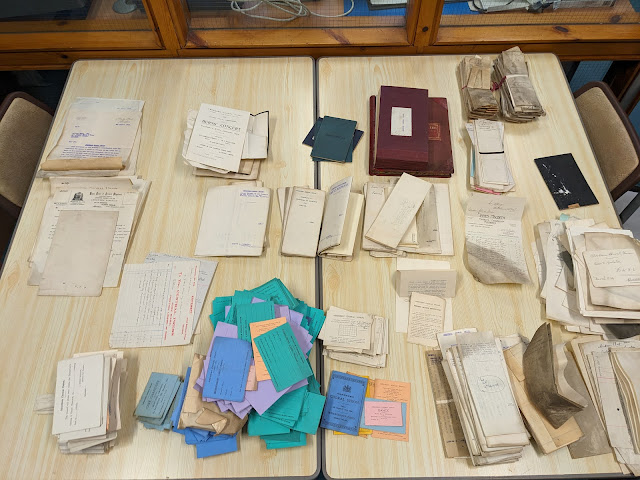Spring Cleaning? Appraisal and Weeding records
Part of the role of an Archivist is to appraise, weed and sort collections of records before they are listed or catalogued and made accessible to the public. This can be both cathartic and a little intimidating, depending on the volume of material you're working with! Are you looking to spring clean the paperwork in your house and feeling overwhelmed? Here are some images of our processes and some tips, if you need them!
The records shown in this blog are from the legal firm Cochran & MacPherson, the collection of which is held at our Old Aberdeen House site, reference DD5. Please note, this collection is in the process of being appraised and is not fully accessible. Descriptions of the catalogued parts of the collection can be viewed here: DD5.
The records we're appraising from this collection are in tin deed boxes or trunks that have not been a priority to work on until recently. The tin trunks are inappropriate as storage for these records, so we're looking to remove the material from them before repacking them into appropriate archival boxes. We hoping that by appraising the records (deciding what we do and don't want to keep), we can also create some more shelving space.
Tip 1: Start by ensuring all the material you want to sort is in the same place, or coming from the same box / boxes. You don't want to find additional material later on that should have been sorted at the same time. Collating everything in one place means you can start sorting!
 |
| Whitehall Bowling and & Tennis Club Ltd., Hamilton Place: tin trunk |
 |
| Whitehall Bowling and & Tennis Club Ltd., Hamilton Place: empty trunk |
Tip 4: Decide what you need to keep and what can be thrown away. We use appraisal guidelines specific to our collections. Make sure any records that need to be disposed of confidentially are shredded. Remember, you can sample records so as to keep a selection of them. The below images are receipts for the Whitehall Bowling and & Tennis Club Ltd. These have been sampled to keep some of interest - there's no need to keep them all particularly as the ledgers contain a better collated and formalised version of the information. The letterheads are nice examples for local businesses though!
Tip 5: Get rid of duplicates! We recently learnt about the '3 copies rule': 'one for use, one for best, one for luck'. Our service tends towards just keeping one copy, as we know we can appropriately care for individual items and keeping multiple copies really takes up a lot of storage space.
Tip 6: Look for quick wins and don't spend time on sorting that doesn't need to happen! Sometimes we come across large volumes of material in our collections that are not for our geographic area or that do not fall within our collecting policy. In one particular trunk, the legal papers all related to the Woodhouse Estate in Dumfriesshire. Our Archivist working on this material only noticed this connection after she had started to decant the material from the tin trunk and sort / appraise it.
As objects, they're not something we would keep in our Archive collections, but they have been offered to our colleagues in the Museums team.
Tip 8: Re-box material into an appropriate sized box. There is nothing worse than having boxes that won't close, or the opposite, boxes that are sat half empty, taking up valuable space for no reason. By starting to appraise, sort and weed the records of DD5 from their tin trunks, we've managed to create a lot more shelving space already.
Tip 9: Recycle - no need to bin paper records. If they're confidential, they should be disposed of appropriately, but if they're not confidential and are paper-based, get them in the recycling.
Tip 10: Photograph before and after - it can give you a real boost to see how much you've done!














.jpg)
.jpg)






Comments
Post a Comment